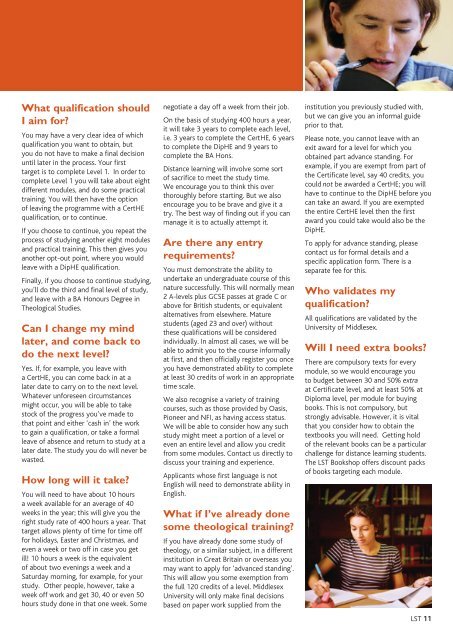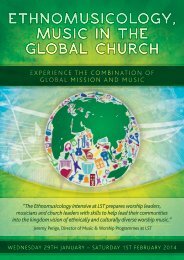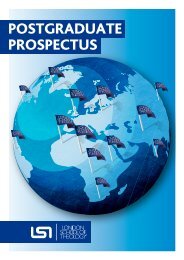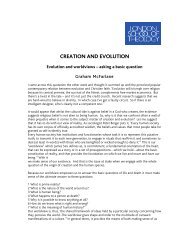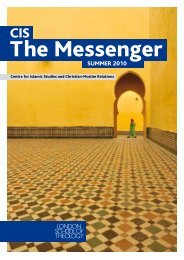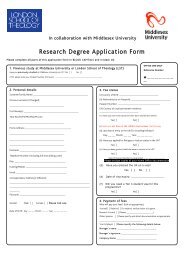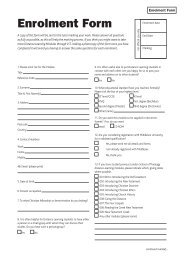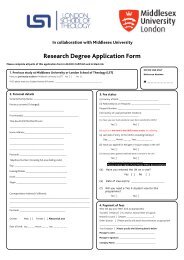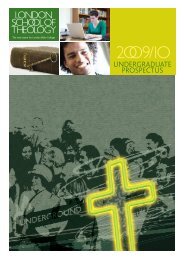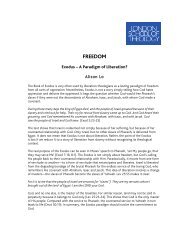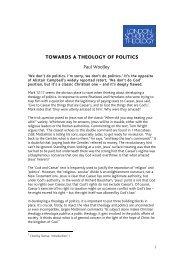Distance Learning Prospectus 2009.pdf - London School of Theology
Distance Learning Prospectus 2009.pdf - London School of Theology
Distance Learning Prospectus 2009.pdf - London School of Theology
Create successful ePaper yourself
Turn your PDF publications into a flip-book with our unique Google optimized e-Paper software.
What qualification shouldI aim for?You may have a very clear idea <strong>of</strong> whichqualification you want to obtain, butyou do not have to make a final decisionuntil later in the process. Your firsttarget is to complete Level 1. In order tocomplete Level 1 you will take about eightdifferent modules, and do some practicaltraining. You will then have the option<strong>of</strong> leaving the programme with a CertHEqualification, or to continue.If you choose to continue, you repeat theprocess <strong>of</strong> studying another eight modulesand practical training. This then gives youanother opt-out point, where you wouldleave with a DipHE qualification.Finally, if you choose to continue studying,you’ll do the third and final level <strong>of</strong> study,and leave with a BA Honours Degree inTheological Studies.Can I change my mindlater, and come back todo the next level?Yes. If, for example, you leave witha CertHE, you can come back in at alater date to carry on to the next level.Whatever unforeseen circumstancesmight occur, you will be able to takestock <strong>of</strong> the progress you’ve made tothat point and either ‘cash in’ the workto gain a qualification, or take a formalleave <strong>of</strong> absence and return to study at alater date. The study you do will never bewasted.How long will it take?You will need to have about 10 hoursa week available for an average <strong>of</strong> 40weeks in the year; this will give you theright study rate <strong>of</strong> 400 hours a year. Thattarget allows plenty <strong>of</strong> time for time <strong>of</strong>ffor holidays, Easter and Christmas, andeven a week or two <strong>of</strong>f in case you getill! 10 hours a week is the equivalent<strong>of</strong> about two evenings a week and aSaturday morning, for example, for yourstudy. Other people, however, take aweek <strong>of</strong>f work and get 30, 40 or even 50hours study done in that one week. Somenegotiate a day <strong>of</strong>f a week from their job.On the basis <strong>of</strong> studying 400 hours a year,it will take 3 years to complete each level,i.e. 3 years to complete the CertHE, 6 yearsto complete the DipHE and 9 years tocomplete the BA Hons.<strong>Distance</strong> learning will involve some sort<strong>of</strong> sacrifice to meet the study time.We encourage you to think this overthoroughly before starting. But we alsoencourage you to be brave and give it atry. The best way <strong>of</strong> finding out if you canmanage it is to actually attempt it.Are there any entryrequirements?You must demonstrate the ability toundertake an undergraduate course <strong>of</strong> thisnature successfully. This will normally mean2 A-levels plus GCSE passes at grade C orabove for British students, or equivalentalternatives from elsewhere. Maturestudents (aged 23 and over) withoutthese qualifications will be consideredindividually. In almost all cases, we will beable to admit you to the course informallyat first, and then <strong>of</strong>ficially register you onceyou have demonstrated ability to completeat least 30 credits <strong>of</strong> work in an appropriatetime scale.We also recognise a variety <strong>of</strong> trainingcourses, such as those provided by Oasis,Pioneer and NFI, as having access status.We will be able to consider how any suchstudy might meet a portion <strong>of</strong> a level oreven an entire level and allow you creditfrom some modules. Contact us directly todiscuss your training and experience.Applicants whose first language is notEnglish will need to demonstrate ability inEnglish.What if I’ve already donesome theological training?If you have already done some study <strong>of</strong>theology, or a similar subject, in a differentinstitution in Great Britain or overseas youmay want to apply for ‘advanced standing’.This will allow you some exemption fromthe full 120 credits <strong>of</strong> a level. MiddlesexUniversity will only make final decisionsbased on paper work supplied from theinstitution you previously studied with,but we can give you an informal guideprior to that.Please note, you cannot leave with anexit award for a level for which youobtained part advance standing. Forexample, if you are exempt from part <strong>of</strong>the Certificate level, say 40 credits, youcould not be awarded a CertHE; you willhave to continue to the DipHE before youcan take an award. If you are exemptedthe entire CertHE level then the firstaward you could take would also be theDipHE.To apply for advance standing, pleasecontact us for formal details and aspecific application form. There is aseparate fee for this.Who validates myqualification?All qualifications are validated by theUniversity <strong>of</strong> Middlesex.Will I need extra books?There are compulsory texts for everymodule, so we would encourage youto budget between 30 and 50% extraat Certificate level, and at least 50% atDiploma level, per module for buyingbooks. This is not compulsory, butstrongly advisable. However, it is vitalthat you consider how to obtain thetextbooks you will need. Getting hold<strong>of</strong> the relevant books can be a particularchallenge for distance learning students.The LST Bookshop <strong>of</strong>fers discount packs<strong>of</strong> books targeting each module.LST 11


